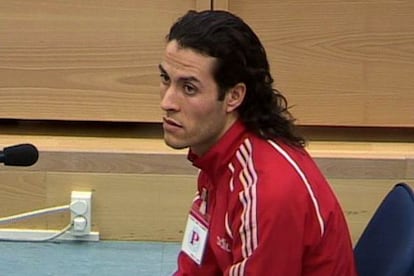How the Atocha bombs ruined Brahim’s life
The young Moroccan was detained by police after the 2004 terrorist attack, but had committed no crime Years later, he is still yet to receive proper compensation

Brahim Moussaten was on his way home after a hard day at the construction site, when all of a sudden a dozen men piled on top of him and threw a black hood over his head. He thought he was being kidnapped, but the attackers were in fact police officers, and this was an arrest. Brahim, his father, his mother and one of his brothers were all detained, and spent five days incommunicado. They were charged with involvement in the March 11, 2004 train bombings in Atocha, which killed 191 people and injured over 1,800 more, making the incident the biggest terrorist attack ever seen on Spanish soil.
The accusation proved to be false, but the experience has had an indelible effect on his life.
The young Moroccan was 21 on February 1, 2005, the day his nightmare began. Just 10 months had elapsed since the attacks, and the country was still reeling from its effects. It was not an easy time to be a Moroccan living in Spain, but the Moussaten family was calm. The father, Allal, had been working for years as a gardener for a residential community that trusted him fully. Brahim's mother, Safia Belhadj, was a homemaker who took care of the family. Brahim was the eldest son; he had arrived in Spain at the age of 11 and was now a construction worker. He lived with his parents and six siblings in Leganés, the Madrid municipality where seven terrorists committed suicide 23 days after the Atocha massacre. None of the Moussatens had ever been arrested before. The only time they had ever set foot in a police precinct was to collect their Spanish ID cards.
Following the arrests, the parents were released but still faced charges, while Brahim and his brother Mohamed were held in custody. All three men in the family lost their jobs — the sons because they were in jail, and the father because he was immediately fired. Nobody wanted to have a suspected terrorist pruning their hedges, even if a judge had released him.
Following the arrests, all three men in the family lost their jobs
The family has yet to recover. Eight years on, Brahim feels increasingly disconcerted. Even though the charges against him were dropped by all the plaintiffs during the 2007 trial, the state refused to give him any compensation for legal reasons that he cannot understand. All he knows is that his life has been ruined, that he will not be getting anything for the 168 days he spent in prison unfairly and in solitary confinement, and that on top of all that, 1,500 euros in his current account have been frozen to cover the costs of the lawsuit he initiated to demand compensation.
Now 29, Brahim does not even want to talk about the whole experience. He would rather have his lawyer, Eduardo García Peña, tell his story. He refuses to think for a minute more about the ill fate that ruined his life and his future, and turned him, in the eyes of others, into a terrorist that he never was.
"Brahim has been through hell," says his lawyer. "It's not just having been locked up in jail. During the trial, all of Spain saw his face again and again [on TV] because of the place where he was sitting. For Spaniards, he became one of the 'March 11 Muslims.' People called him and his family murderers, and they lost everything: their friendships, any possibility of finding a job... The Moroccans, on the other hand, suspected that some kind of deal had been reached with the police when the charges against him were dropped. Neither case was true, but the stigma remains. And nobody is going to compensate him for it."
It was García Peña who assisted him after his arrest as the court-appointed counsel. At first he thought Brahim was holding back information. He was convinced there must be something that his client was not telling him. "But Brahim kept insisting that he didn't understand anything," he recalls. "He was in despair, denying any link to the attacks or to Islamic terrorists. The whole experience was like a horror movie for him. When the court records were unsealed, I saw that there was no evidence against him."
The authorities seized 1,500 euros from his account to cover his court case
The police went to the Moussatens' house looking for information about Yousef Belhadj, Brahim's maternal uncle, who was living in Belgium. He was suspected of helping some of the terrorists after the Leganés group committed suicide. One of the terrorists, Mohamed Afala, had asked his brother to go to the Moussatens and ask them for Yousef's phone number. He did, and asked to speak with Brahim, who was not at home. Instead he spoke with his brother Mohamed. The Moussatens did not know what the phone number was for, nor were they aware that Yousef — whom Brahim had only seen three or four times in his life, and who was later acquitted of instigating the attacks but still given a 12-year conviction for associating with terrorists - was being investigated at all.
Because of that, Brahim spent 168 days in prison. After that he was released because of the low flight risk, and finally, in the middle of the trial, the attorney and the plaintiffs dropped the charges against him. He continued showing up at the trial to be near his younger brother, who was later acquitted. "Both brothers were free to come and go, and every morning they would take the Metro to the Casa de Campo pavilion [where the hearings took place]," recalls the lawyer. "They were filled with dread. They were worried about bumping into the victims. Those were very tense moments and they were threatened and insulted. Plus, the trial was financially costly for them. They were the breadwinners in the family, and they could not work. They spent eight hours a day in there for the five months that the trial lasted."
And when it was all over, their problems were just beginning. The Moussaten family set up a fruit shop, but it didn't work out. People tried to beat them up and their establishment was spray painted. Brahim lost his Spanish and Moroccan friends, and any chance of a job. Years later, he is still dogged by financial troubles. That is why he asked for compensation. He thought that since life had already tripped him up, it was only fair that someone should help him get back on his feet again.
"I recommended that he try because his was practically a textbook case," says García Peña. He and his colleague Beatriz Aranda filed for a 1.2-million-euro compensation payout, which the High Court refused. The Supreme Court also turned down the petition, while both the Constitutional Court and the Strasbourg Court of Human Rights rejected the appeals without exploring the issue.
The Supreme Court feels that the only people who deserve compensation are those who were unfairly jailed when there was no crime, or when a legal mistake that is "unquestionable, patent, indisputable and objective" is made - something that is very hard to prove. In this case, the justice system considers that there was indeed a crime: the Atocha massacre.
"But Brahim was not being accused of a terrorist attack; he was being charged with aiding an armed group, and I believe the crime does not exist because this act of aiding did not take place," says García Peña. "In any case, and legal considerations aside, it's normal that he shouldn't understand anything. All he knows is that he has suffered a complete injustice that destroyed his life at the age of 21, and that on top of that he is being denied compensation."
The Supreme Court also ruled that he should pay the cost of the legal proceedings. Right before the summer, authorities seized the 1,500 euros that he had in his account, and he needed for his family, since he is currently unemployed. His life has become a succession of trip-ups. That is why he doesn't even want to talk about it.
Tu suscripción se está usando en otro dispositivo
¿Quieres añadir otro usuario a tu suscripción?
Si continúas leyendo en este dispositivo, no se podrá leer en el otro.
FlechaTu suscripción se está usando en otro dispositivo y solo puedes acceder a EL PAÍS desde un dispositivo a la vez.
Si quieres compartir tu cuenta, cambia tu suscripción a la modalidad Premium, así podrás añadir otro usuario. Cada uno accederá con su propia cuenta de email, lo que os permitirá personalizar vuestra experiencia en EL PAÍS.
En el caso de no saber quién está usando tu cuenta, te recomendamos cambiar tu contraseña aquí.
Si decides continuar compartiendo tu cuenta, este mensaje se mostrará en tu dispositivo y en el de la otra persona que está usando tu cuenta de forma indefinida, afectando a tu experiencia de lectura. Puedes consultar aquí los términos y condiciones de la suscripción digital.









































